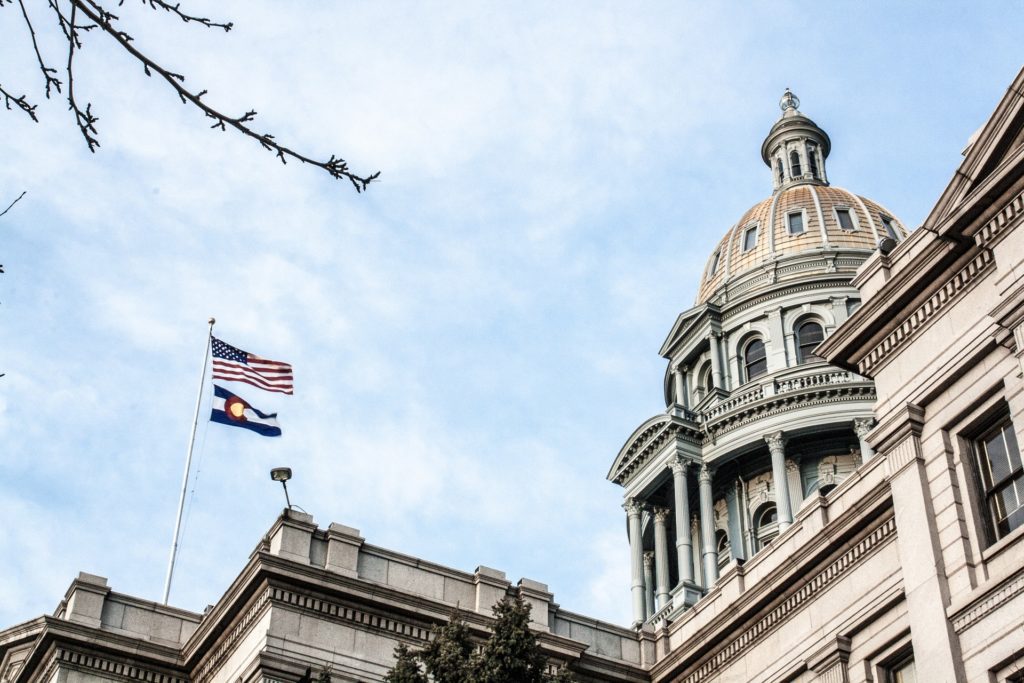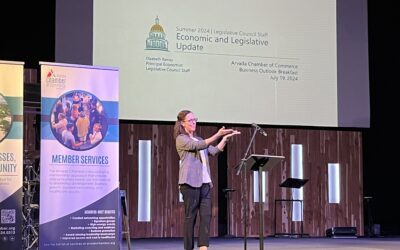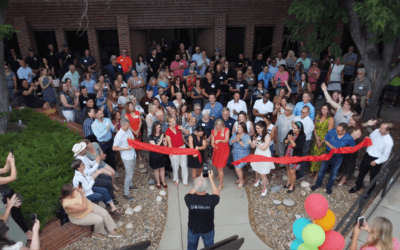By Jeff Weist (Jefferson County Business Lobby), Katie Winner (For The Win Communications, Ltd.) and the Arvada Chamber Advocacy KAPS Council
At this midpoint of the 74th General Assembly, the Jefferson County Business Lobby (JCBL) — the united voice of JeffCo businesses at the Colorado State Capitol – pauses to provide you this update on bills that we have been tracking through the state legislature this session.
Business Regulation
HB24-1014 – Deceptive Trade Practice Significant Impact Standard
This bill would remove the “Significant Public Impact Test” in the Colorado Consumer Protection Act, allowing for any individual to sue a business without having to prove broad based impact and therefore could open up every business, at any time, to individual consumer lawsuits. This proposal was killed in 2023 and is currently bottled up in committee.
HB24-1151 – Disclose Mandatory Fees in Advertisements
This bill prohibits a person from advertising a price for a product, good, or service that does not include all mandatory or non-discretionary fees or charges. A violation of this prohibition is a deceptive trade practice enforceable by the attorney general or a district attorney. A number of business groups are still seeking amendments or exemptions from the bill.
HB24-1156 – Chamber of Commerce Alcohol Special Event Permit
This bill concerns authorization to hold special events where substances that minors are prohibited from purchasing are served, and in particular was designed to assist local chamber of commerce events throughout the state.
HB24-1260– Prohibition Against Employee Discipline
This bill would prohibit an employer from requiring an employee to attend meetings, listen to speech, or view communications concerning religious or political matters or take actions against an employee’s refusal to participate in these meetings. This contentious bill has been significantly amended through negotiations with the business community, but chamber groups remain opposed and are seeking additional amendments.
Workforce and Education
HB24-1160 – Economic Development Organization Action Grant Program
This bill would create the Economic Development Organization (EDO) action grant program to provide grants to Colorado-based EDOs to implement community-specific economic development programming with a cash fund of $2 million dollars.
HB24-1305 – Changes for Concurrent Enrollment Students
The bill expands the types of programs and pathways in technology early college high school (p-tech school) may focus on beyond science, technology, engineering, and mathematics, and extends the amount of time that an undergraduate student can receive a stipend.
HB24-1340 – Incentives for Post-Secondary Education
The bill creates two separate state income tax incentives (incentives) to encourage enrollment in institutions of higher education for “top jobs” needed in Colorado’s workforce.
SB24-104 – Career & Technical Education & Apprenticeships
This bill would require the state apprenticeship agency to align the high school career and technical education system and expand the number of aligned pathways, prioritizing programs and occupations related to infrastructure, advanced manufacturing, education, or health care.
SB24-143 – Credential Quality Apprenticeship Classification
This bill works to ensure the effective integration of the quality non degree credentials framework within the state’s education and workforce systems and to evaluate non degree credentials offered through state-recognized programs to ensure the credentials meet the framework’s quality standards.
Labor and Employment
HB24-1008 – Wage Claims Construction Industry Contractors
This bill would make a General Contractor in the construction industry liable for wage theft claims against a subcontractor. Making the employer liable for the actions of a completely separate employer is a dramatic step that will have far reaching implications for employers outside of construction. If this bill passes, similar “joint-employer” liability will be expanded to other industries in the coming years.
HB24-1095 – Increasing Protections for Minor Workers
This bill seeks to strengthen child labor laws, and increase fines for violations of current laws, but may hinder participation of employers and businesses in Work-Based Learning and Career and Technical Education program partnerships in Jeffco and beyond.
HB24-1220 – Workers’ Compensation Disability Benefits
This bill concerns disability benefits for workers’ compensation injuries and how those claims are paid. The most controversial proposal in the bill would have significantly raised the caps on partial permanent disability payments. Through negotiations with the business community, a compromise was reached.
Housing
HB24-1083 – Construction Professional Insurance Coverage Transparency
This bill seeks to create a task force to complete a study of the insurance market and then require a developer, prior to the sale of new residence, to file with the County Clerk making public details of all construction related insurance for that property. This bill was amended down to a study of the construction liability insurance market, as legislators seek answers on how best to increase the supply of affordable housing through new construction.
HB24-1098 – Cause Required for Eviction of Residential Tenant
With certain exceptions, this bill would prohibit a landlord from evicting a residential tenant unless the landlord has cause for eviction, and then seeks to redefine and set new definitions for evictions. This bill has major implications on private property rights and, along with a slew of other new regulations and liabilities recently piled on housing owners, will likely disincent new investment in affordable housing supply.
HB24-1107 – Judicial Review of Local Land Use Decision
This bill, in instances where land use cases are escalated to court processes, allows for “reasonable” expenses to be recouped by the prevailing side. The bill attempts to reduce the incentives to litigate against housing and other developments by suing the local land use authority.
HB24-1125 – Tax Credit Commercial Building Conversion
This bill would create an income tax credit for qualified costs incurred in the conversion of a commercial structure to a residential structure. Such residential conversions of increasingly empty office buildings is a compelling idea, but very expensive to actually pull off. The $5 million set aside for grants to conversion projects is a small but important start.
HB24-1152 – Accessory Dwelling Units
This bill seeks to increase the number of accessory dwelling units by establishing a unique accessory dwelling unit supportive jurisdiction, allow more ADU’s throughout the state and prohibits subject jurisdictions from enacting or enforcing certain local laws that would restrict the construction or conversion of an accessory dwelling unit.
HB24-1175 – Local Governments Rights to Property for Affordable Housing
This bill concerns a local government right of first refusal or offer to purchase qualifying multifamily property for the purpose of providing long-term affordable housing or mixed-income development. An attempt to increase the stock of affordable housing by allowing a local government to step into the sale of apartment buildings, this version is watered down from last year’s but still controversial.
HB24-1230 – Protections for Real Property Owners
This bill concerns construction defect litigation and seeks to add protections for consumers to the Colorado Consumer Protection Act, sets interest rates of payments on claims, expands the statute of limitations on filing a claim and would allow a group lawsuit against a construction professional. Broadly opposed by the business community, this bill would significantly increase the litigation to developers and contractors on not only condo projects, but even single family construction, as well.
SB24-106 – Right to Remedy Construction Defects
This legislation seeks to create a right for a construction professional to remedy a claim made against the construction professional by doing remedial work or hiring another construction professional to perform the work. This bill has a large coalition of local governments, developers, contractors and business groups behind it. It represents the best change this legislature has to even modestly improve the negative litigation environment preventing the construction of attainable, entry level condominiums in Colorado.
SB24-112 – Construction Defect Action Procedures
This bill requires additional approval processes from homeowners and homeowners associations to approve any lawsuits filed on a condo complex’s behalf and clarifies the home builder responsibility for implied warranties on homes.
Energy and the Environment
HB24-1235 – Reduce Aviation Impacts on Communities
This bill seeks to reduce the noise and lead-based gasoline impacts from general aviation airports and commercial airports by creating a state income tax credit for owners of aircraft to switch to unleaded gasoline, subsidize the purchases of unleaded aviation gasoline to airports and increase the Colorado Aeronautical Board from 7 to 9 voting members. This bill has been significantly amended to address concerns of the Rocky Mountain Metropolitan Airport.
HB24-1339 – Disproportionately Impact Community Air Pollution
This bill seeks to improve air quality in the state by first increasing the Air Quality Control Commission to 11 members, adding one member who represents a disproportionately impacted community and the interests of communities of color and a climate scientist and further directing the commission to adopt new rules to reduce air pollution between 2025 and 2030.
SB24-159 – Modification to Energy & Carbon Management Processes
This bill seeks to end issuing new oil and gas permits by January 2030 and reduce the number of permits issued between 2028 and 2029.
SB24-165 – Air Quality Improvements
This bill seeks to reduce the emissions of air pollution by creating an “ozone season” and requires the department of transportation to establish vehicle miles traveled reduction targets for the covered nonattainment area and to develop policies and programs to assist applicable metropolitan planning organizations in meeting the reduction targets.
SB24-166 – Air Quality Enforcement
This bill seeks to strengthen current laws and expands the ability of the Department of Public Health and Environment to issue fines and penalties to violators without court proceedings. This and the preceding three bills are all part of a loose and hugely controversial package of environmental bills generally aimed at the oil and gas industry.
Tax Policy
HB24-1041 – Streamline Filing Sales & Use Tax Returns
This bill seeks to eliminate unnecessary paperwork by increasing the thresholds at which businesses need to file sales tax returns on a periodic basis, therefore making it easier for small businesses by cutting red tape and clarifying the process for businesses of all sizes. This is one of a handful of bills making small, but important, changes to Colorado’s overly complex sales tax system.
HB24-1157 – Employee-Owned Business Office & Income Tax Credit
The bill creates the employee ownership office, and an income tax credit for specified costs incurred by new employee-owned businesses.
SB24-23 – Hold Harmless for Error in GIS Database Data
This bill will hold businesses harmless for errors in the statewide GIS database imputed by the taxing entity, and not come back to the business at a later time for taxes incorrectly applied. This bill is broadly supported by the business community and maybe the most important of the this year’s sales tax reform bills.
SB24-085 – Sales & Use Tax Rebate for Digital Asset Purchases
This bill would allow a data center business, or a data center operator, to claim a rebate for all state sales and use tax that the taxpayer paid for construction materials or data center equipment that is for the construction or operation of an eligible data center. The large $10 million price tag means the fate of this one is yet to be determined.
———–
Through the B.O.L.D. 2026 initiative, Advocacy KAPS Council, the Jefferson County Business Lobby (JCBL), and consistent outreach to elected officials at all levels of government, the Arvada Chamber strives to stay informed on the latest policy developments while advocating for a strong local economy. Find resources and ways to engage at arvadachamber.org/advocacy.



0 Comments